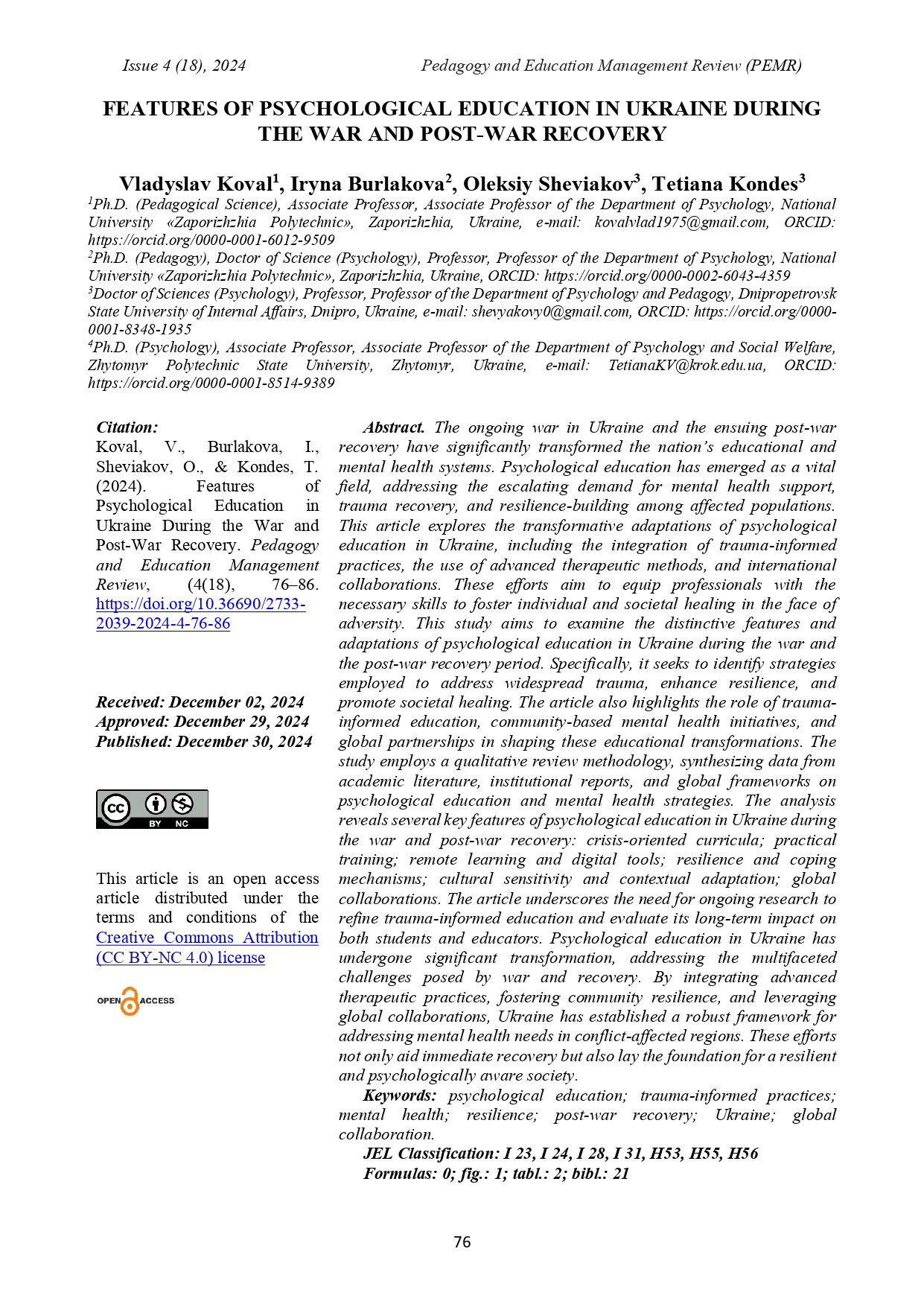FEATURES OF PSYCHOLOGICAL EDUCATION IN UKRAINE DURING THE WAR AND POST-WAR RECOVERY
DOI:
https://doi.org/10.36690/2733-2039-2024-4-76-86Keywords:
psychological education, trauma-informed practices, mental health, resilience, post-war recovery, Ukraine, global collaborationAbstract
The ongoing war in Ukraine and the ensuing post-war recovery have significantly transformed the nation’s educational and mental health systems. Psychological education has emerged as a vital field, addressing the escalating demand for mental health support, trauma recovery, and resilience-building among affected populations. This article explores the transformative adaptations of psychological education in Ukraine, including the integration of trauma-informed practices, the use of advanced therapeutic methods, and international collaborations. These efforts aim to equip professionals with the necessary skills to foster individual and societal healing in the face of adversity. This study aims to examine the distinctive features and adaptations of psychological education in Ukraine during the war and the post-war recovery period. Specifically, it seeks to identify strategies employed to address widespread trauma, enhance resilience, and promote societal healing. The article also highlights the role of trauma-informed education, community-based mental health initiatives, and global partnerships in shaping these educational transformations. The study employs a qualitative review methodology, synthesizing data from academic literature, institutional reports, and global frameworks on psychological education and mental health strategies. The analysis reveals several key features of psychological education in Ukraine during the war and post-war recovery: crisis-oriented curricula; practical training; remote learning and digital tools; resilience and coping mechanisms; cultural sensitivity and contextual adaptation; global collaborations. The article underscores the need for ongoing research to refine trauma-informed education and evaluate its long-term impact on both students and educators. Psychological education in Ukraine has undergone significant transformation, addressing the multifaceted challenges posed by war and recovery. By integrating advanced therapeutic practices, fostering community resilience, and leveraging global collaborations, Ukraine has established a robust framework for addressing mental health needs in conflict-affected regions. These efforts not only aid immediate recovery but also lay the foundation for a resilient and psychologically aware society.
Downloads
References
Betancourt, T. S., Meyers-Ohki, S. E., Charrow, A., & Tol, W. A. (2010). Mental health and psychosocial problems in children affected by armed conflict: Theoretical and intervention considerations. Journal of Child Psychology and Psychiatry, 51(6), 503-521. https://doi.org/10.1111/j.1469-7610.2010.02241.x
Burlakova, I., Sheviakov, O., & Kondes, T. (2021). PSYCHOLOGICAL PREDICTORS OF THE FORMATION OF HEALTH-PRESERVING COMPETENTNESS OF FUTURE SPECIALISTS. Public Administration and Law Review, (4), 74–79. https://doi.org/10.36690/2674-5216-2021-4-74
Dmytrova, L., & Kovalenko, M. (2021). Psychological education in Ukraine: Adapting to the challenges of conflict and recovery. Ukrainian Journal of Educational Psychology, 14(3), 215-229.
Koltko-Rivera, M. E. (2018). Trauma-informed teaching: Principles and practices for educators. Journal of Psychological Education, 12(1), 45-56.
Kornieva, I., & Solomakha, O. (2024). Education and resilience in the context of war: Challenges and adaptations in Ukraine's education system. Futurity Education, 4(2), 25-36. https://doi.org/10.57125/FED.2024.12.25.16
Kuznetsova, I. M. (2022). Psychological support of the educational process in primary school in the conditions of war and post-war times. Institute of Information Technologies and Learning Tools. Retrieved from: https://lib.iitta.gov.ua/id/eprint/743604/?utm_source=chatgpt.com
Lueger-Schuster, B. (2023). Psychological condition of Ukrainians during the war: Post-war perspectives. ResearchGate. https://doi.org/10.13140/RG.2.2.37701.47588
Matkivskyi, M., & Petrovska, K. (2024). Dimensions of personal transformations in conditions of war and post-war recovery. Institute of Information Technologies and Learning Tools. Retrieved from: https://lib.iitta.gov.ua/id/eprint/743890
Miller, K. E., & Rasmussen, A. (2017). War exposure, daily stressors, and mental health in conflict and post-conflict settings: Bridging the divide between trauma-focused and psychosocial frameworks. Social Science & Medicine, 92, 168-175. https://doi.org/10.1016/j.socscimed.2017.03.029
Prykhodko, I., Matsehora, Y., Kolesnichenko, O., Baida, M., & Vasylkovskyi, O. (2023). The psychological recovery program of Ukrainian military personnel after completing combat missions in the Russian-Ukrainian war. Československá Psychologie, 67(6), 455-473. https://doi.org/10.51561/cspsych.67.6.455
Safonov, Y., & FlіarkovskaO. (2023). Ukrainian Education in the War and Post-War Periods: Psychological Factors and Economic Consequences. Problems of Education, (1(98), 6-22. https://doi.org/10.52256/2710-3986.1-98.2023.01
Shevchenko, O. (2022). The evolution of psychological education in Ukraine during wartime. European Educational Research Journal, 21(4), 302-318. https://doi.org/10.1177/1474904121100213
Sheviakov, O., Slavska, Y., & Cherednichenko, O. (2024). PSYCHOLOGICAL SUPPORT OF THE DEVELOPMENT OF THE REHABILITATION POTENTIAL OF EMPLOYEES OF THE FORCE. Public Administration and Law Review, (3(19), 67–74. https://doi.org/10.36690/2674-5216-2024-3-67-74
Sheviakov, O., Kornienko, V., Burlakova, I., & Slavska, Y. (2022). Psychological support for the development of rehabilitation potential of power structures specialists. Public Administration and Law Review, (1), 58–65. https://doi.org/10.36690/2674-5216-2022-1-57
Substance Abuse and Mental Health Services Administration (SAMHSA). (2014). SAMHSA’s concept of trauma and guidance for a trauma-informed approach. U.S. Department of Health and Human Services. https://www.samhsa.gov/trauma-violence
Sukhomlynskyi, V., & Matkivskyi, M. (2024). Psychological support of the educational process in primary school in conditions of war and post-war times. Institute of Information Technologies and Learning Tools. https://lib.iitta.gov.ua/id/eprint/743604/
Vyshha, O., & Rij, G. (2023). Ukrainian education in the war and post-war periods: Psychological challenges and support mechanisms. Institute for Modernisation of Education Content. https://imzo-journal.org.ua/index.php/journal/article/view/84
Zelenska, O. (2023). The "Psychological Forces of Ukraine" project: Promoting resilience during wartime. UNESCO Journal, 2(1), 51-62. https://www.unesco-journal.com.ua/index.php/journal/article/view/51
Zelensky, V. (2023). Project "Psychological Rehabilitation in Nature": Conditions of martial law. Institute of Psychology of the National Academy of Pedagogical Sciences of Ukraine. https://ojs.ipv.org.ua/index.php/journal/article/view/37
Zelensky, V., & Kornieva, I. (2023). Dimensions of personal transformations in conditions of war and post-war recovery. Institute of Information Technologies and Learning Tools. https://lib.iitta.gov.ua/id/eprint/743890/
Zhyhaylo, N., Sheviakov, O., & Slavska, Y. (2023). Psychotherapy and Psychoeducation at Work with Psychotrauma in the Conditions of War. Public Administration and Law Review, (3), 60–68. https://doi.org/10.36690/2674-5216-2023-3-60-68







